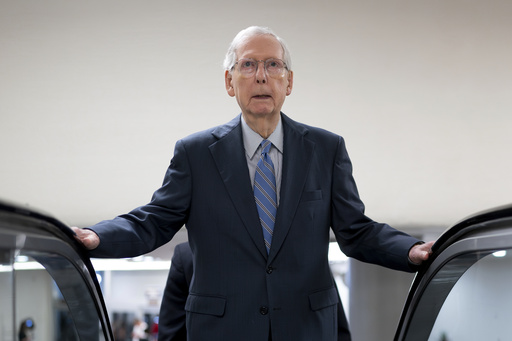
LOUISVILLE, Ky. — Senator Mitch McConnell, a prominent Republican figure, announced on Thursday that he will not pursue reelection in the upcoming year, effectively concluding his extensive career marked by significant influence on conservative policies, even as he adapted to the rising populism within the GOP led by former President Donald Trump.
In a poignant moment coinciding with his 83rd birthday, McConnell revealed his decision not to run for another term in Kentucky, signaling his retirement once his current term finishes. Prior to his address on the Senate floor, he shared this news with the Associated Press.
This declaration marks the beginning of the closing chapter for a distinguished career notable for his strategic prowess. McConnell has played a vital role in shaping a conservative judiciary, navigating the Senate through complex tax legislation, and managing numerous contentious political battles over the years.
“Seven times, my fellow Kentuckians have sent me to the Senate,” McConnell stated in his prepared remarks. He expressed gratitude towards his constituents, acknowledging the honor of representing Kentucky. “I will not seek this honor an eighth time. My current term in the Senate will be my last,” he stated.
Having first been elected in 1984, McConnell aims to complete his term, which wraps up in January 2027. His time in office has not come without personal challenges, as he has faced various health issues in recent years, including injuries from falls and episodes where his speech was temporarily affected.
McConnell’s speech will take place in a Senate chamber he admired as an intern long before transitioning to leadership roles there in the mid-1980s. His announcement also comes nearly a year following his decision to step back from leadership roles after the November 2024 elections, which led to South Dakota Senator John Thune succeeding him as the majority leader.
As McConnell prepares to leave office, his departure highlights the evolving landscape of a GOP increasingly dominated by Trump’s populist style. His influence has waned alongside both his declining health and the deteriorating relationship with Trump, who once regarded him favorably but has since launched critical remarks towards him.
McConnell’s exit from the political scene will be felt significantly in Kentucky, where he was a formidable advocate. This sets the stage for a competitive primary within the Republican Party for the now-open Senate seat. Meanwhile, Kentucky’s Democratic Governor Andy Beshear, recognized for his recent electoral successes in a predominately Republican state, has indicated he is not interested in running for the Senate, although he is seen as a potential candidate for broader political pursuits.
A staunch supporter of traditional conservative values and robust foreign policy, McConnell has struggled to align with a party increasingly swayed by populist sentiments championed by Trump. Despite disagreements, McConnell continues to advocate for supporting Ukraine against Russian aggression, juxtaposed against Trump’s critics. He plans to emphasize that national defense will remain a priority during his remaining term.
“Thanks to Ronald Reagan’s determination, the work of strengthening American hard power was well underway when I arrived in the Senate,” he remarked in his speech. “But since then, we’ve allowed that power to wither. And today, a dangerous world threatens to surpass our efforts to rebuild it.” McConnell reiterated his commitment to fulfilling his responsibilities before his departure.
The once-collaborative relationship between McConnell and Trump fell apart after the January 6, 2021, Capitol riot, a situation McConnell directly blamed on Trump’s actions. Despite a brief reconciliation in 2024 when McConnell endorsed Trump, tensions have resurfaced, particularly after recent contentious exchanges regarding COVID-19 vaccinations and public health measures.
Previously, they collaborated effectively to enact significant tax reforms and reshape the Supreme Court with three successful nominations. However, McConnell’s strategic maneuvering manifested notably in 2016 when he blocked a hearing for then-President Obama’s Supreme Court nomination of Merrick Garland, arguing that the selection should be left to the incoming president.
In contrast, after Justice Ruth Bader Ginsburg’s death shortly before the 2020 election, McConnell expedited Amy Coney Barrett’s confirmation, dismissing claims of hypocrisy amid criticisms. Additionally, he managed two impeachment trials against Trump, both resulting in acquittals but met with McConnell’s own condemnation of Trump’s role in the Capitol insurrection.
Navigating back and forth between majority and minority leader, McConnell’s tenure witnessed substantial federal funding allocated to Kentucky while helping his party to thrive in a historically Democratic stronghold.
Married to Elaine Chao, a prominent figure in Washington herself, McConnell referred to her as his closest confidante in his speech. Chao served as the labor secretary under Bush and as the transportation secretary during Trump’s administration, resigning in the wake of the Capitol attack, expressing her deep concern over the incident.
In his farewell remarks, McConnell underscored his enduring commitment to the Senate and addressed his critics, expressing confidence in the Senate’s continued capability to address significant issues.
“The Senate is still equipped for work of great consequence,” he concluded. “And, to the disappointment of my critics, I’m still here on the job.”

